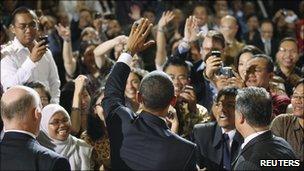Barack Obama's Indonesia charm offensive
- Published

Obama's speech at the University of Indonesia, got an enthusiastic reception from the young audience
If you had stood someone up twice, you would be lucky to get a third date. But if you do, you had better turn on the charm.
That is exactly what Barack Obama did during his 18 hours in Jakarta.
This is the city he called home as a child. And its people were feeling neglected after two planned visits were cancelled at short notice earlier this year.
Schoolchildren had rehearsed songs, TV networks had produced special programmes, and people had prepared everything from banners to welcome parties.
But all the plans went to waste as Mr Obama missed confirmed dates in March and June because of domestic political problems.
This time, while many Indonesians were hoping it would be third time lucky, they were not allowing their hopes to get too high - as if they could not bear to have their emotions toyed with again.
"People in general are losing their enthusiasm for Obama's visit," said Professor Azyumardi Azra, a Muslim scholar, just before the president's arrival.
"Indonesia deserved to be the first [foreign] visit of Obama - he should give a symbolic gesture."
The natural disasters which have battered the country in recent weeks also played their part in keeping the mood low-key.
Images of the death and devastation caused by Mount Merapi's eruptions dominated TV coverage in the hours before Air Force One touched down.
In-jokes
But once it did, everything changed.
Local journalists cheered as they watched TV pictures of Barack and Michelle Obama walking down the steps of their 747. And from that moment on, the president played a blinder.
In his joint news conference with his host, President Susilo Bambang Yudhoyono, Mr Obama got the press corps chuckling with in-jokes about the Jakarta traffic - and impressed them with his perfect pronunciation when he reeled off a few phrases in Indonesian.
In all the excitement, the conservative information minister, Tifatul Sembiring, forgot his policy of never making physical contact with women who are not his relatives.
He warmly clasped Michelle Obama's hands in his - although he later tried to claim it was an accident.
It got better. When they met two years ago, the US president told his Indonesian counterpart of his love for the local comfort food classics nasi goreng and bakso (fried rice and meatballs).
When they were served at the state banquet, he duly expressed his delight in Indonesian. All captured by the microphones, of course.
.jpg)
Deri prepares nasi goreng at the Jalan Sabang hawker centre in Jakarta
It seems the way to an Indonesian's heart is through the stomach. Any residual frostiness towards Mr Obama seemed to melt away from that point on.
Down at the Jalan Sabang hawker centre in the centre of Jakarta, Deri was busy cooking nasi goreng while the VIP version was being served at the state palace.
He was thrilled that what he sold to his customers for a few thousand rupiah was also good enough for a world leader.
"I love it that he's so enthusiastic about Indonesian food. The way he talked about it made me feel like he's one of us."
But one of Deri's regulars, Sogi, added a cautionary note.
"The way to an Indonesian's heart is not just through the stomach. It's through words and deeds as well."
'Like a rock concert'
Mr Obama tried to provide both during the final hours of his visit.
He went to the Istiqlal mosque, the largest in South East Asia, noting that it was designed by a Christian architect and across the road from Jakarta's Catholic cathedral.
It was a symbol of how people of different faiths could work together in the name of progress.
Then he gave a speech at the University of Indonesia, to an enthusiastic reception from the young audience.
Every word he spoke in Indonesian was greeted with cheers. "Pulang kampung, nih," he said: "I've come home to the village."
But the president's broader message was appreciated as well.
It revolved around the national motto - "Unity in Diversity" - which Mr Obama repeated at the start and end of his speech.
Holding Indonesia up as an example for others to follow, he pressed home his support for democracy, human rights and religious tolerance.
There was just one problem.
"His speech was too short," said one student in the audience. "It was like watching a rock concert. We were left wanting more."
- Published9 November 2010
- Published10 November 2010
- Published8 November 2010
- Published8 November 2010